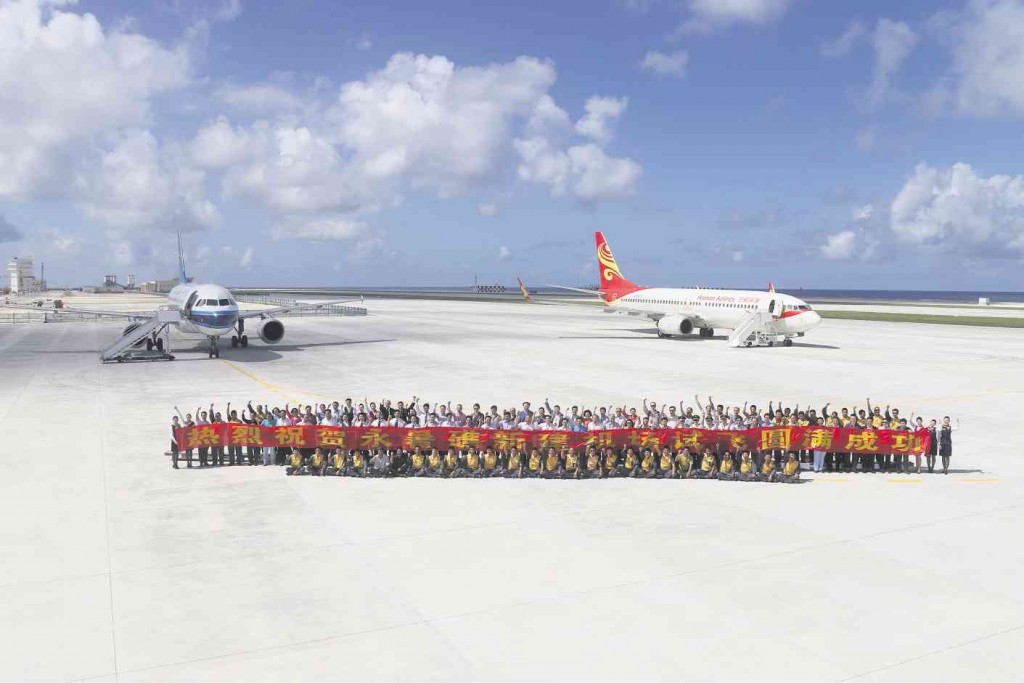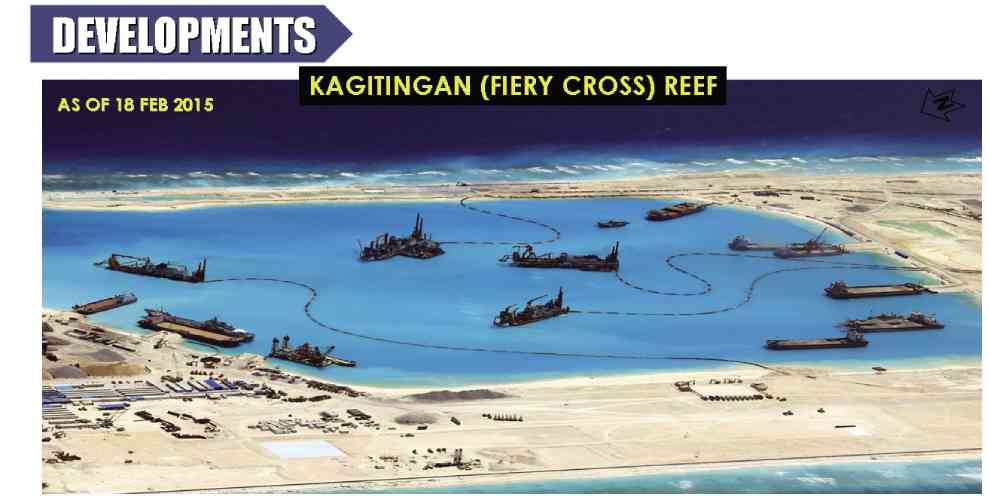Manila formally files protest against China over test flights

COMMERCIAL PLANES LANDONKAGITINGAN Passengers and crew of a Hainan Airlines plane and a China SouthernAirlines plane pose for a souvenir photo on Kagitingan (Fiery Cross) Reef in the Spratlys that China has transformed into an airfield. The ChinaDaily newspaper said the two planes made the two-hour flight to the reef from Hainan province on Jan. 6. XINHUA/AP
THE PHILIPPINES has filed a diplomatic protest against China’s test flights to Kagitingan Reef (Fiery Cross Reef) on the Philippine side of the Spratly archipelago, the Department of Foreign Affairs (DFA) said Wednesday, describing Beijing’s actions as “provocative” and a violation of an informal code of conduct for claimants to territory in the disputed South China Sea.
But China has quickly rejected the Philippine protest, citing its “undisputed sovereignty” over almost the entire South China Sea, said Assistant Secretary Charles Jose, spokesperson for the DFA.
Last week, China landed three flights on the 3,125-meter-long runway of the airstrip on the artificial island it had built on Kagitingan Reef, angering Vietnam, which also claims the reef, and drawing criticism from the United States, which expressed deep concern that the landings would exacerbate tensions in the region.
Jose said the Philippines filed the diplomatic protest through a representative of the Chinese Embassy in Manila on Jan. 8.
“We formally protested the recent test flights conducted by China on Kagitingan Reef and its provocative actions restricting the freedom of navigation and overflight in the West Philippine Sea,” Jose said, using the local name for the waters within the Philippine exclusive economic zone (EEZ) in the South China Sea.
Article continues after this advertisementJose said China’s actions heightened tensions and anxiety in the region.
Article continues after this advertisement2002 declaration
The test flights, he said, violated “the spirit and letter” of the Declaration on the Conduct of Parties in the South China Sea, which was signed by the 10-member Association of Southeast Asian Nations (Asean) and China in 2002.
Under that deal, China and the Asean claimants agreed to “exercise self-restraint” and avoid actions that would escalate tensions over territorial disputes in the strategic waterway.
Jose said the Chinese representative who received the Philippine protest reiterated China’s position that it had “indisputable sovereignty” over almost the entire South China Sea, making the test flights well within Beijing’s rights.
In Beijing, Chinese foreign ministry spokesperson Hong Lei rejected Manila’s protest, saying China had the right to freely fly over the South China Sea, as did other countries.
‘Ulterior motives’
“The Philippines’ criticism has ulterior motives and is not worth refuting,” Hong told a daily news briefing.
The Philippines earlier expressed concern that the test flights could be followed by the establishment of a Chinese air defense identification zone, which Foreign Secretary Albert del Rosario described as “unacceptable.”
China has declared a similar zone over the East China Sea, where it is locked in dispute with Japan over ownership of five uninhabited islands, known as Senkakus to the Japanese and Diaoyus to the Chinese.
Japan, the United States and other countries have rejected the Chinese air defense zone, as they have rejected China’s artificial island building in the South China Sea to bolster its claim to nearly all of the waterway through which $5 trillion in global trade passes every year.
China’s claims overlap with those of the Philippines, Vietnam, Brunei, Malaysia and Taiwan.

DISPUTED REEF Photos provided by the Center for Strategic and International Studies show Kagitingan (Fiery Cross) Reef (above) with a 3,125-meter-long airstrip built by China and reclamation work (right) going on on the reef in the Spratly archipelago also claimed by the Philippines and Vietnam. REUTERS/CSIS/AFP/PAO
PH arbitration case
Vietnam has fought naval battles with China over their overlapping claims, while the Philippines, which has no military muscle to defend its territory in the Spratlys, has asked the United Nations Permanent Court of Arbitration in The Hague to invalidate China’s claim to Philippine territory in the South China Sea.
China has ignored the proceedings, saying it will not accept any decision by the tribunal.
The court, however, has proceeded to hear the Philippine case, and is expected to hand down a ruling by June.
Asked what step the Philippines planned to take after China rejected its protest over the test flights, Jose said the DFA was focused on the arbitration case.
“We believe this is the durable solution to the conflicting maritime claims in the South China Sea,” he said.
Since 2010, China and Asean have been negotiating a legally binding code of conduct to replace the informal rules contained in the 2002 agreement.
China, however, has been slow at talks with the Asean countries, but has been fast to reclaim land on reefs in the Spratly archipelago to bolster its claims and, presumably, hand the UN arbitration court a fait accompli when the tribunal hands down its decision on the Philippine case.
READ: PH files diplomatic protest vs China over test flights
For comprehensive coverage, in-depth analysis, visit our special page for West Philippine Sea updates. Stay informed with articles, videos, and expert opinions.